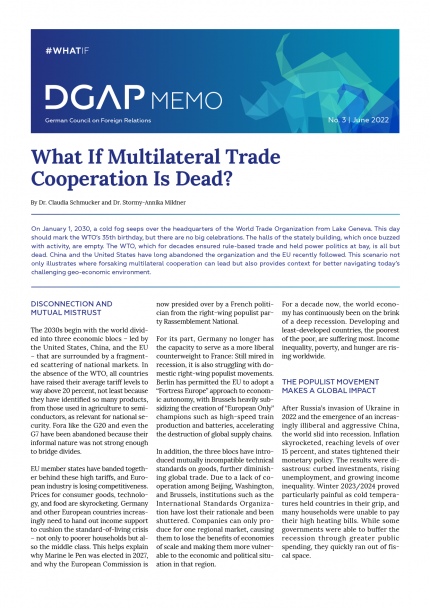Disconnection and Mutual Mistrust
The 2030s begin with the world divided into three economic blocs – led by the United States, China, and the EU – that are surrounded by a fragmented scattering of national markets. In the absence of the WTO, all countries have raised their average tariff levels to way above 20 percent, not least because they have identified so many products, from those used in agriculture to semiconductors, as relevant for national security. Fora like the G20 and even the G7 have been abandoned because their informal nature was not strong enough to bridge divides.
EU member states have banded together behind these high tariffs, and European industry is losing competitiveness. Prices for consumer goods, technology, and food are skyrocketing. Germany and other European countries increasingly need to hand out income support to cushion the standard-of-living crisis – not only to poorer households but also the middle class. This helps explain why Marine le Pen was elected in 2027, and why the European Commission is now presided over by a French politician from the right-wing populist party Rassemblement National.
For its part, Germany no longer has the capacity to serve as a more liberal counterweight to France: Still mired in recession, it is also struggling with domestic right-wing populist movements. Berlin has permitted the EU to adopt a “Fortress Europe” approach to economic autonomy, with Brussels heavily subsidizing the creation of “European Only” champions such as high-speed train production and batteries, accelerating the destruction of global supply chains.
In addition, the three blocs have introduced mutually incompatible technical standards on goods, further diminishing global trade. Due to a lack of cooperation among Beijing, Washington, and Brussels, institutions such as the International Standards Organization have lost their rationale and been shuttered. Companies can only produce for one regional market, causing them to lose the benefits of economies of scale and making them more vulnerable to the economic and political situation in that region.
For a decade now, the world economy has continuously been on the brink of a deep recession. Developing and least-developed countries, the poorest of the poor, are suffering most. Income inequality, poverty, and hunger are rising worldwide.
The Populist Movement Makes a Global Impact
After Russia’s invasion of Ukraine in 2022 and the emergence of an increasingly illiberal and aggressive China, the world slid into recession. Inflation skyrocketed, reaching levels of over 15 percent, and states tightened their monetary policy. The results were disastrous: curbed investments, rising unemployment, and growing income inequality. Winter 2023/2024 proved particularly painful as cold temperatures held countries in their grip, and many households were unable to pay their high heating bills. While some governments were able to buffer the recession through greater public spending, they quickly ran out of fiscal space.
Consequently, populist movements gained traction in many countries. In November 2024, Donald Trump was elected US President for the second time. His first day in office began with him again tearing up the global rulebook, withdrawing US membership from the WTO. Trump also fell into his old habit of painting the EU as a foe – a parasite on the US economy, an unreliable partner against China – and abandoned all dialogue with it.
China, still under the presidency of Xi Jinping, soon followed the United States out of the WTO but for different reasons. It had successfully created Chinese Champions through massive subsidies, lessening its dependence on trade. This national success precipitated China’s abandonment of the G20 in 2027. As for the G7, starting in 2028, it met only at a technical level, as there were no longer any overlapping interests in trade, climate, and other global challenges – and the smallest of the seven members were getting smaller still.
It was only a matter of time before the EU abandoned the WTO as well. The triumph of Marine Le Pen in 2027 had changed Europe’s attitude toward global cooperation. Even in the run-up to her election, the new buzz phrases in Brussels were “national champions” and “strategic autonomy” – the less dependence on others the better. This led to increased subsidies and higher tariffs in Europe, significantly lowering the standard of living.
From a Division of Labor to Europe On Its Own
Starting in 2024 with the reelection of Donald Trump, it became clear that power politics in trade were there to stay. With the United States abandoning the WTO, the EU started to realize the value of the existing fabric of preferential trade agreements with African, Asian, and American countries as a safety net for rules-based trade. It soon finished and ratified several outstanding trade agreements to enhance economic partnerships.
Most German parties agreed to this on the grounds that it was the only way to support growth and forge international alliances in the new geo-economic environment. However, with the election of Marine Le Pen and the dominance of French politics at the EU level, this strategy was quickly abandoned in favor of subsidizing EU economies and decreasing economic interdependence. The EU only focused on negotiating deals with select countries to secure critical raw materials and energy.
Due to high debt, the European Union loses its triple A rating, the best given by international credit rading agencies. To counter this, its member states – including Germany – agree to implement the banking union. Countries that were previously opposed to it now assent. At the same time, strict restrictions on outward foreign direct investment are introduced to protect the EU. To support the euro, the European Central Bank must repeatedly intervene in currency markets



